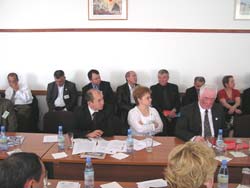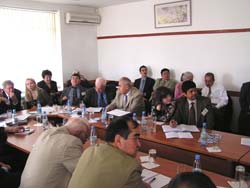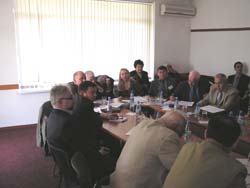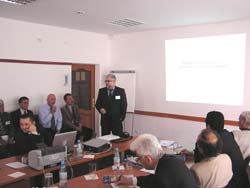SESSION “CENTRAL ASIA REGIONAL WATER INFORMATION BASE”
Within the framework of the Central Asian International Scientific Practical Conference dedicated to the 15th anniversary of ICWC, a session “Central Asia Regional Water Information Base” was held. Representatives from stakeholders of the CAWater-Info Portal and CAREWIB Information System, executors and a donor of the CAREWIB Project took part in the session:
For the Republic of Kazakhstan - AO KEGOC; Committee for Water Resources at the Ministry of Agriculture of Kazakhstan
For the Kyrgyz Republic - Ministry of Agriculture, Water Resources and Processing Industry of the Kyrgyz Republic; AO “Elektricheskiye stantsii”; Institute for Strategic Research at the President of the Kyrgyz Republic
For the Republic of Tajikistan - Institute “TajikNIIGiM”; Ministry of Agriculture and Environment of Tajikistan; Institute of Water Problems, Hydropower and Ecology at the Academy of Sciences of Tajikistan
For Turkmenistan - SIC ICSD
For the Republic of Uzbekistan -Ministry of Agriculture and Water Resources of Uzbekistan; State Committee for Nature Conservation of Uzbekistan; Institute of Water Problems at the Academy of Sciences of Uzbekistan; Central Asian Scientific Research Institute of Irrigation (SANIIRI); Center for Social and Economic Research
Regional organizations - SIC ICWC; BWO Amudarya; BWO Syrdarya; ICWC Secretariat; Central Asia Regional Environmental Center (CAREC)
International organizations - Swiss Agency for Development and Cooperation; UN Economic Commission for Europe; ADB; FAO; UNESCO-IHE
NGOs - “Logos”; “Zerafshan Basin Protection”
The meeting was attended by: Director for Department of Agriculture, Environment and Natural Resources of Asian Development Bank Mr. Katsuji Matsunami, representative of UN FAO Office Mr. Giovanni Munoz, officials of SDC Mr. Sandjar Djalalov (Uzbekistan) and Mr. Zafar Samadov (Tajikistan), Director for Department of UNESCO-IHE Mr. Joop de Schutter.


Director of Swiss Cooperation Office in the Kyrgyz Republic Mr. Hanspeter Maag and Director of SIC ICWC Prof. Viktor Dukhovny opened the meeting and welcomed the participants.
At the meeting, reports of key leaders and key specialists of the CAREWIB Project on the results of Phase 1, on opportunities for analytical use of CAREWIB, and a concept for developing activities in Phase 2 were presented. Furthermore, the results of a Review Team were presented by independent experts Prof. E.Zh. Makhmudov (Uzbekistan ) and E.E. Orolbayev (Kyrgyzstan).
The meeting participants and the Review Mission noted that the creation of Central Asian Regional Information System with Water and Environmental Portal is unique in the region, the project is now of high interest, and is a first step in satisfying information needs in water, environmental and associated sectors of economy and water resources use.
It was noted that the created and permanently updated electronic library of SIC ICWC and the regularly updated information service aiming at a broader implementation of integrated water resources management in Central Asia are positive project results.
The CAREWIB Project has increased the ICWC information potential for the assessment of water, land and other natural resources use, and created a unique instrument that uses state-of-the-art information technologies like integrated interface uniting database, GIS, modeling and analytical instruments.
The meeting participants were also presented a Concept of the Project Document for Phase 2, which includes 4 basic components:
- Component 1 – Enhance information scope and coverage of CAREWIB Portal and Information System including strengthening mechanisms for data collection.
- Component 2 – Production and dissemination of publications and other types of information.
- Component 3 – Capacity building in water management organizations and among other users and integrate CAREWIB into decision-making processes of national, regional and international bodies as well as in public debate.
- Component 4 – Ensure long-term political and financial support to CAREWIB.
The speakers and participants of the Review Team noted the high usefulness of this project, while they expressed some desires and remarks:
- Partner relationships with users and participants of the project should be expanded and formalized.
- A mechanism for information supplier and user feedback should be developed.
- A list of available information in the Information System, possibility of and rules for access to it should be determined.
- Information scope in other water user and related sectors, apart from ICWC, should be extended.
- A permanent column informing about activities of IFAS and its executive bodies should be introduced.
- Information on forthcoming events (conferences, workshops, meetings), and not just on their results should be included in News Digest. In this section, a list of questions discussed at these meetings can be announced.
- To improve the performance of the CAREWIB Project, it is suggested within the framework of the project to study the issues of interaction with national information systems in water resources management and environmental protection. The main objectives of such interaction should be to:
- Organize thematic Internet forums for experience exchange between Central Asian countries on rational use and protection of water resources, improvement of water use culture;
- Hold training seminars on active use of information resources on water-related problems for personnel of ministries and departments, enterprises and organizations in charge of water resources management and environmental control. This will enable to more effectively use the capacity of the CAREWIB Project.


The participants of the meeting unanimously made the following suggestions:
- Approve the results of Project Phase 1, and note the substantial and unique work done on creation of Regional Web-Portal and Information System.
- Approve the prepared “Brief Concept for Developing a Sustainable Information Service on Water Resources in the Aral Sea Basin” containing the general provisions of activities in Project Phase 2; include remarks and suggestions made by stakeholders to the project document.
- Focus the attention in Phase 2 on the improvement of national information systems in such a format as that of CAREWIB, while institutionally formalizing partnerships between organizations at national level as well as between national and regional levels.
- Further orientate the development of the Portal and Information System to three directions correlating with water hierarchy levels in the Aral Sea basin:
a) regional, including IFAS, ICWC, ICSD and key BWOs in the basin;
b) national, including ministries and departments of water resources/agriculture, environment, energy and emergency situations, hydromet services, NGOs;
c) lower hierarchy level (“grass roots”), including farmers and WUAs: including to create and develop on the portal a knowledge base for extension services to farms and WUAs, using the experience of the “IWRM-Fergana” Project for this purpose.
- In IS, it is necessary to develop instruments for analysis, including a mechanism for information validation for completeness and reliability, and instruments for modeling, which would enable to improve:
- Methods for assessment and forecasting of usable water resources, including calculation of channel losses and lateral inflow,
- Methods for planning of water resources distribution and flow regulation by reservoirs,
- Methods for assessment of water resources use efficiency (assessment of water requirements in comparison with water withdrawal and no-productive water losses, assessment of water and land productivity with respect to potential value, assessment of collector water disposal, identification of idle discharges and so on);
- Measures to reduce risks of extreme situations in the basin (drought, flood), and mitigate them;
- Operation of WUA extension services regarding analysis and forecasting of climatic and water situations (irrigated agriculture).
- As much as possible of the Information System should be accessible through the Portal.
For more accurate definition of necessary analytical instruments, a user poll should be conducted.
|